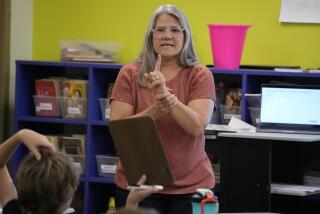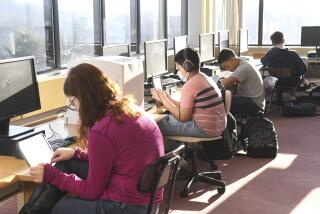In Schools, ‘Freedom’ Brings Mediocrity
- Share via
I thought maybe they were just being polite. Although the findings of the Third International Mathematics and Science Study thundered across major newspapers here and in Asia, at first not one Asian official or expert at a conference in Palm Springs last week needled me that this authoritative study ranked America’s 13-year-olds without distinction for math and science scores among 7th and 8th graders tested in 41 countries. No one mentioned that the top four national performers in math were from Asia (the United States scored 28th); or that three of the top four nations in science were from Asia (we finished 17th).
The geopolitical conference, co-sponsored by Claremont McKenna College’s Keck Center for International and Strategic Studies and the Sejong Institute of South Korea, examined the troubled strategic relationship between Asia and America--an issue that President Clinton was working on this week at the 18-nation Asian-Pacific conference near Manila. I could have gotten an earful; the conference participants were former top government officials, prominent academics, business and professional leaders from Asia and the United States who fully appreciate the links between the economic and intellectual health of a nation and the quality of its public education.
As it turned out, the Asian participants in Palm Springs, while worried about America, aren’t crowing. They, too, have their problems. Tiny Singapore, for instance, scored first worldwide in both science and math but has yet to produce a university on a par with America’s top tier. Japan finished third in both math and science but is vexed by its “creativity gap”--its schools teach students to test brilliantly but not to think for themselves. Without an endless supply of natural resources and low-cost labor, a major economy like Japan’s requires innovation in order to survive, much less to soar. Admitted an Asian educator, “Kids in Asia do not have the time to do their own thing. It’s study, study, study. Initiative suffers. It’s a problem throughout Asia.” Added Woosang Kim, a Korean political science professor at Sookmyung University, whose country finished a proud second in math and fourth in science: “Don’t forget your upside. You have brilliant universities that are the envy of the world.” It’s true: It seems like half the cabinets of Asia have advanced degrees from American universities.
That’s a plus for them and an honor for us--but it doesn’t solve the problem of properly educating all of our own. The usual excuses don’t wash: The U.S.is second only to Norway in per-capita expenditure on public education, class sizes here are not measurably better or worse than anywhere else and our kids lug home as much homework as anyone else. Plenty of private schools and some public school systems do deliver the goods, but not enough do.
In contrast, societies like South Korea and Taiwan practically make a religion of educating all citizens well, regardless of family wealth.
The survey singles out Singapore for excellence. I guess in their spare moments, when Singaporeans aren’t caning one another, they must be teaching or studying. Said a top government economist there, when I visited, “We think of our young people as our retirement investment. More than any pension plan or savings account, their performance in the world economy will determine our national wealth. If we stint on their education, everyone will pay.”
Recall (if you’re old enough!) the spirit of America’s response to the Soviet Sputnik surprise of 1957 that scared the nation half to death and triggered an all-out national effort in math and science education. Today, with the Cold War over, we are letting too many children fail at school.
A few days before the release of the math and science report, educators at a dinner party with Barry Munitz, chancellor of the mammoth 23-campus California State University system, were exploring just this issue. Among them was a well-mannered college student who came here with her family after completing elementary school in Singapore. So, she was asked, how would you compare the teaching of math and science here and there? She thought a moment, and replied: “Well, in Singapore you take a full course of algebra in the fifth grade.”
I rest my case--and fall back on the great American education philospher, John Dewey: “Education is not preparation for life; education is life itself.” That’s true not only in the life of a citizen, but of a nation as well.
More to Read
Sign up for Essential California
The most important California stories and recommendations in your inbox every morning.
You may occasionally receive promotional content from the Los Angeles Times.













